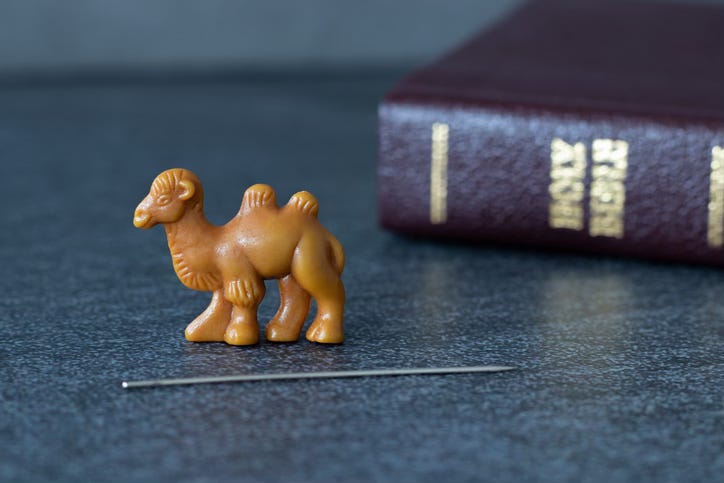

Discover more from The Cottage
Sunday Musings
On wealth, camels, sword drills, and reading the Bible both seriously and literally
Today is the Twenty-First Sunday after Pentecost.
In the United States, the presidential election is 23 days away (if you receive this on Saturday, make that 24).
On Friday, I sent out a post about truth, a subject that I’ve spoken to quite a bit this autumn. It includes a recent letter by Lutheran bishops on the theological nature of truth and the moral calling to speak out against lies. Lying, falsehood, and purposeful deception have emerged as the dominant strategy of Trump’s campaign — making it increasingly difficult for many Americans to sort through the onslaught. You might also be interested in this piece on the erosion of reality (a gift article from The Atlantic) and this article on disinformation.
Things are getting tense here. Even today’s lectionary readings are not for the faith-hearted. Or for those afraid of a radical gospel. They center on a continuing theme woven throughout this fall’s texts — the power of words to wound or heal, to destroy or save.
The truth matters. And, as Hebrews says, the word is living and active.
Praying for you preachers out there — courage! If you go to church and your pastor preaches a brave sermon, please make sure you thank them. For our friends outside of the United States, please hold us in prayer and intention.
Make sure to scroll all the way through today’s post. There’s a great quote under the camel picture at the end.
Hebrews 4:12-13
The word of God is living and active, sharper than any two-edged sword, piercing until it divides soul from spirit, joints from marrow; it is able to judge the thoughts and intentions of the heart. And before him no creature is hidden, but all are naked and laid bare to the eyes of the one to whom we must render an account.
Mark 10:17-31
As Jesus was setting out on a journey, a man ran up and knelt before him, and asked him, “Good Teacher, what must I do to inherit eternal life?”
Jesus said to him, “Why do you call me good? No one is good but God alone. You know the commandments: ‘You shall not murder; You shall not commit adultery; You shall not steal; You shall not bear false witness; You shall not defraud; Honor your father and mother.’”
He said to him, “Teacher, I have kept all these since my youth.”
Jesus, looking at him, loved him and said, “You lack one thing; go, sell what you own, and give the money to the poor, and you will have treasure in heaven; then come, follow me.”
When he heard this, he was shocked and went away grieving, for he had many possessions.
Then Jesus looked around and said to his disciples, “How hard it will be for those who have wealth to enter the kingdom of God!” And the disciples were perplexed at these words. But Jesus said to them again, “Children, how hard it is to enter the kingdom of God! It is easier for a camel to go through the eye of a needle than for someone who is rich to enter the kingdom of God.” They were greatly astounded and said to one another, “Then who can be saved?” Jesus looked at them and said, “For mortals it is impossible, but not for God; for God all things are possible.”
Peter began to say to him, “Look, we have left everything and followed you.” Jesus said, “Truly I tell you, there is no one who has left house or brothers or sisters or mother or father or children or fields, for my sake and for the sake of the good news, who will not receive a hundredfold now in this age — houses, brothers and sisters, mothers and children, and fields with persecutions — and in the age to come eternal life. But many who are first will be last, and the last will be first.”
When I read this week’s lectionary texts, I remembered this story from my friend, Brad. If you’ve read A People’s History, it might seem familiar — as it showed up in that book:
At the height of Liberation theology in the 1980s, my friend Brad lived in Latin America, where he participated in a base community, a kind of radical Bible study group in an impoverished village. Lay members rotated leadership, each week reading a text, offering an interpretation drawn from their own experience, and trying to relate scriptural stories to their own lives in order to inspire justice and social change.
One week, the biblical passage was the story in which Jesus commands the rich young ruler to sell all his possessions and give the money to the poor in order to find eternal life…. Brad, an American evangelical, had grown up in a middle-class family and attended a good college.
"It was fascinating to hear my new friends interpret this passage in such a different context," Brad said. "They were very poor and they understood it very literally. They were comfortable with Jesus's rejection of wealth."
Brad admitted that he felt uncomfortable, however, especially when one person turned to him and asked how "our brothers and sisters in America" interpreted the story. He explained that Americans do not read the story literally. Rather, evangelicals take the direction spiritually. "Jesus insists that we give up whatever means the most to us in order to follow him, not necessarily our possessions,” he told the Bible study, “The story isn't about money. It is about what we treasure more than salvation.”
The group fell silent. Brad was unsure of what he had said. Finally, one of the leaders asked how they could trust that he was really a Christian — since it was obvious that he did not "take the Bible seriously."
Brad shared this episode with me in the early 1990s, about five or six years after it occurred. I vividly recall the conversation. He seemed to still be wrestling with their response to his comments — and the entire thing had made him increasingly uncomfortable with the selective literalism and fixed interpretations of the Bible from his evangelical youth. These days, he might have told me that the base community initiated his “deconstruction” of faith. But we didn’t have that language then.
I clearly remember my own reaction to Brad’s story. I gasped a little, feeling almost as if I’d been struck in the gut. And it seemed to shift my reality — what I’d simply accepted as truth was shown, in one glancing blow, to be nothing other than a cultural assumption about Christianity and wealth that bordered on theological falsehood. Was my reading of scripture actually heretical? Was it possible that Christians in an impoverished village understand the Bible far better than me?
I suppose that preachers will use this passage as a springboard to talk about Jesus’ views of money. I equally suppose that far too many of them will offer up the softened North American spiritualized version of it, whether those preachers are evangelicals or not. Some sermons this weekend might avoid the economic aspect altogether — pretty potent political stuff for three weeks before an election — and concentrate on salvation, camels and needles, Jesus’ views of family, or the parabolic poetry of first will be last, and the last will be first.
Those various readings are more or less valuable. This year, however, the Hebrews passage stands out to me in relation to Brad’s story:
The word of God is living and active, sharper than any two-edged sword, piercing until it divides soul from spirit, joints from marrow; it is able to judge the thoughts and intentions of the heart. And before him no creature is hidden, but all are naked and laid bare to the eyes of the one to whom we must render an account.
That portion of Hebrews is popular with evangelicals — whose churches often hold “sword drills” in which churchgoers parry and attack each other using memorized Bible verses to demonstrate their scriptural prowess! Seeing the Bible as the “sword of the Lord” is a commonplace among some Christians.
You don’t often hear that language in more liberal Christian churches. This verse — as well as the corresponding verse in Ephesians, “Take…the sword of the Spirit, which is the word of God” — are politely avoided in favor of comforting and comfortable texts. Less sword and more enlightenment.
However, the story of the rich young ruler pokes and jabs. Both Brad’s initial experience and my reaction simply hearing of the base community startles. We squirm; we try to explain it away; we soften the criticism of the Latin American Christians. Yet, this story cuts through false assumptions, self deceptions, and the biases we wrongly believe to be reality — the word of God is living and active.
Ouch.
Sometimes people ask me why I still care about the Bible — why I like to preach or why I write Sunday Musings. Especially since I’m not ordained, not a minister in any tradition, and could just as easily ignore it all. These are days when Christianity seems to matter less and less, so why bother?
Sundays like this are why I still care. The biblical story of the rich young ruler is dazzling — it is a story of a man with everything who was cut to the bone by Jesus’ words. And it is a continuing story about every Christian who ever heard it, wrestled with it, and responded to it throughout history.
Oddly enough, when Brad told me his story it reminded me of my own first serious encounter with the rich young ruler. Although Brad’s story shows up in A People’s History, I had originally written that part of the book using my experience instead of his. Here’s the unpublished first draft of the section:
When I was a college student, I read the story about Jesus and the rich young ruler. A youth approached Jesus asking what he must do to inherit eternal life. Jesus told him that he must love God — and give away all his possessions to the poor.
The passage struck me as it never had before. Loving God meant getting rid of possessions?!
On an impulse, I ran to my closet. I love clothes. I always have. Were they standing between heaven and me? I ripped them off their hangers, threw them in the back of my car, and drove down to the local Salvation Army store where I promptly stuffed piles of beautiful skirts and sweaters in the donation box.
When I returned to the dorm, I only owned about six shirts, two pairs of jeans, and a dress. I felt a burst of freedom, this shedding of my clothes.
For about six months, I wore only those few things until, when the shirts ripped, my girlfriends begged me to replace my wardrobe (fearing for my romantic life, I surmised), a project that took about half of my summer savings. As I paid the bill at Ross Dress-for-Less, I grumbled to my friend Karin that the Bible was a dangerous book to read.
My first adult reaction to the rich young ruler was much closer to the base community than that of some learned theologian. I jumped into the story, took it at face value, and sought to live it.
A well intentioned attempt, yes. And an empty closet. It left me with questions.
Did Jesus mean it literally? My youthful idealism and the “real world” collided.
The Bible is dangerous in so many ways. No wonder we mute it, spiritualize it.
It is important to notice that while this story reveals a real struggle with material goods, it also points to the truth of the other passage today — that Hebrews text. For how we react to the rich young ruler does, indeed, reveal our deepest “thoughts and intentions.”
Jesus’ encounter with the rich young ruler lays us bare. Whether we are 18 or 80. There’s no hiding from this ancient story. It is a kind of spiritual lunge with a piercing attack that goes to the heart.
Why the Bible? Where else can one hear a story like this? The reversal of the American dream, the voice of the poor proclaiming the truth? Ours is an age of billionaires, economic inequality that is actually worse than that of ancient Rome, and the glorification of obscene wealth. I need this Jesus — we need this Jesus — to send the rich away sad.
The word of God is living and active, sharper than any two-edged sword, piercing until it divides soul from spirit, joints from marrow; it is able to judge the thoughts and intentions of the heart.
Maybe I’m more like the rich young man than I’d like to admit. I’ve certainly been quick to minimize his actions and too easily defended him.
I just glanced in my closet. I have far too many clothes.
Paid subscribers can comment at any time. For free readers and visitors, commenting is limited to a short period after publication and then closed.
INSPIRATION
Lying, thinking
Last night
How to find my soul a home
Where water is not thirsty
And bread loaf is not stone
I came up with one thing
And I don’t believe I’m wrong
That nobody,
But nobody
Can make it out here alone.
Alone, all alone
Nobody, but nobody
Can make it out here alone.
There are some millionaires
With money they can’t use
Their wives run round like banshees
Their children sing the blues
They’ve got expensive doctors
To cure their hearts of stone.
But nobody
No, nobody
Can make it out here alone.
Alone, all alone
Nobody, but nobody
Can make it out here alone.
Now if you listen closely
I’ll tell you what I know
Storm clouds are gathering
The wind is gonna blow
The race of man is suffering
And I can hear the moan,
’Cause nobody,
But nobody
Can make it out here alone.
Alone, all alone
Nobody, but nobody
Can make it out here alone.
— Maya Angelou, “Alone”
To whom, exactly, are you speaking Lord?
I take it you’re not saying this to me,
But just to this rich man, or to some saint
Like Francis, or to some community,
The Benedictines maybe, their restraint
Sustains so much. But I can’t bear this word!
I bought the deal, the whole consumer thing,
Signed up and filled my life with all this stuff,
And now you come, when I’ve got everything,
And tell me everything is not enough!
But that one thing I lack, I cannot get.
Sell everything I have? That’s far too hard
I can’t just sell it all… at least not yet,
To whom exactly, are you speaking Lord?
— Malcolm Guite
The Convocation Unscripted Goes on the Road!
We’re heading out to swing states with a Faith & Democracy Tour.
Sunday, October 13: Greensboro, NC at First Baptist, 6PM
Sunday, October 20: Tempe, AZ at Dayspring UMC, 5PM
Come out and hear me, Robert P. Jones, Jemar Tisby, and Kristin Du Mez on Christian nationalism (we’re not for it!) and why people of faith must be engaged in politics in this LIVE in-person Convocation Unscripted — plus great music!
It is free — bring your friends.
DETAILS and REGISTRATION INFO HERE!
The man’s question – “What must I do to inherit eternal life?” — seems to be a straightforward inquiry about salvation.
But Jesus neither opens his arms in universal enfranchisement, as in the tradition of modern liberal theology, nor demands proper belief, as conservative dogmatism dictates. Instead, Jesus challenges him, equally straightforwardly, to redistribute his assets to the poor. An encounter that began with such theological promise concludes with the man’s decisive rejection of discipleship (10:22). Worse, Jesus seems to shrug it off with a crude class explanation: “How difficult it is for the wealthy to enter the kingdom of God!” (10:24)
Strangely, this story has not seemed to be overly troubling in Christendom. Perhaps this is because theologians have spent so much intellectual energy undermining its plain meaning.
— Ched Myers
Subscribe to The Cottage
Part retreat, part think tank. A place for inspiration and ideas about culture, faith, and spirit.














Diana, I’m always left with a question about this story, because we don’t know how it ended. The young man went away sorrowful because of his possessions. You went away upset because of your many clothes…and then you took action! I like to think this young man may have taken action, as well, after mulling things over. We don’t know how his story ended…
In his most recent book, The Great Search, John Philip Newell points out that the "camel" in this famous parable is a mistranslation (p. 136). The Greek for "camel" and "rope" are very similar-- go figure!
"It is easier for a rope to pass through the eye of a needle...." is an immediately understandable image, isn't it. No need for esoteric knowledge of Jerusalem's Old City gates.
And yet, hundreds of years of scholars have just rolled right over this, preferring to get caught up in the confusing and nonsensical, and somehow sidestepping the impact of the obvious.
I think this is another way in which we tell ourselves, "Jesus didn't really mean what he said."